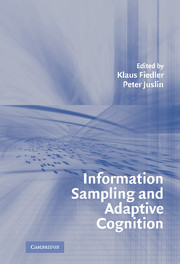Book contents
- Frontmatter
- Contents
- List of Contributors
- PART I INTRODUCTION
- PART II THE PSYCHOLOGICAL LAW OF LARGE NUMBERS
- 2 Good Sampling, Distorted Views: The Perception of Variability
- 3 Intuitive Judgments about Sample Size
- 4 The Role of Information Sampling in Risky Choice
- 5 Less Is More in Covariation Detection – Or Is It?
- PART III BIASED AND UNBIASED JUDGMENTS FROM BIASED SAMPLES
- PART IV WHAT INFORMATION CONTENTS ARE SAMPLED?
- PART V VICISSITUDES OF SAMPLING IN THE RESEARCHER'S MIND AND METHOD
- Index
- References
5 - Less Is More in Covariation Detection – Or Is It?
Published online by Cambridge University Press: 02 February 2010
- Frontmatter
- Contents
- List of Contributors
- PART I INTRODUCTION
- PART II THE PSYCHOLOGICAL LAW OF LARGE NUMBERS
- 2 Good Sampling, Distorted Views: The Perception of Variability
- 3 Intuitive Judgments about Sample Size
- 4 The Role of Information Sampling in Risky Choice
- 5 Less Is More in Covariation Detection – Or Is It?
- PART III BIASED AND UNBIASED JUDGMENTS FROM BIASED SAMPLES
- PART IV WHAT INFORMATION CONTENTS ARE SAMPLED?
- PART V VICISSITUDES OF SAMPLING IN THE RESEARCHER'S MIND AND METHOD
- Index
- References
Summary
INTRODUCTION
One of the more celebrated conclusions in cognitive psychology refers to the limited computational capacity of controlled thought, as typically epitomized by Miller's (1956) estimate of a short-term-memory holding capacity of “seven-plus-or-minus-two” chunks. That people can only keep a limited amount of information active for controlled processing at any moment in time has inspired humbling conclusions in regard to problem solving (Newell & Simon, 1972), reasoning (Evans, Newstead, & Byrne, 1993), and, perhaps especially, judgment and decision making (Gilovich, Griffin, & Kahneman, 2002). This limitation is often raised as a main obstacle to people's attainment of classical rationality, suggesting that at best people can aspire to bounded rationality (Simon, 1990). In the context of this volume the implication is that at any moment in time controlled processes of thought can only access a small sample of observations.
The default interpretation seems to be to emphasize the liabilities of these limitations and to regard the current state in the evolutionary development as representing at best a local maximum. Organisms are thus restricted to limited samples of information, although there is agreement that on normative grounds as much information as possible is needed to optimize judgments and decisions. More rarely is the question raised of whether there can be a functional significance attached to apparent cognitive limitations.
Information
- Type
- Chapter
- Information
- Information Sampling and Adaptive Cognition , pp. 92 - 124Publisher: Cambridge University PressPrint publication year: 2005
References
Accessibility standard: Unknown
Why this information is here
This section outlines the accessibility features of this content - including support for screen readers, full keyboard navigation and high-contrast display options. This may not be relevant for you.Accessibility Information
- 1
- Cited by
